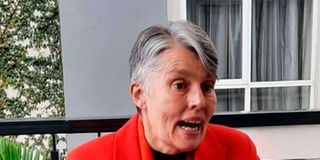African scientist among four gunning for IPCC top leadership

South African scientist Debra Roberts at an IPCC meeting in Nairobi in May.
What you need to know:
- Also in town was Prof Roberts, the current co-chair of IPCC Working Group two.
- The natural sciences scientist who has been involved in biodiversity, climate change adaptation, resilience and mitigation in the past three decades, says she is cut out for the job at the UN body.
Kenya is set to host the 55th Session of the Intergovernmental Panel on Climate Change (IPCC) between July 25-28, where an election for a new chairperson will be held.
The UN body created 35 years ago to provide policymakers with regular scientific assessments on climate change, saw some of the contestants jet into Kenya to woo voters, who will participate in the elections, which have attracted four candidates namely Debrah Roberts of South Africa, Belgium’s Jean-Pascal van Ypersele, Thelma Krug of Brazil and the United Kingdom’s Jim Skea.
Exuding confidence ahead of the meeting, Prof Ypersele, a climate physicist at the University of Louvain and Belgium’s candidate for the IPCC chair, is betting on his experience and expertise to clinch the position.
“I'm probably one of the candidates with the longest experience in climate science. I am the only climate scientist in the ring. I've worked on climate change not only from the physical science point of view but also in collaboration with scientists from many other disciplines during my almost 30 years at the IPCC," he said during his visit to Kenya last month.
Also in town was Prof Roberts, the current co-chair of IPCC Working Group two. The natural sciences scientist who has been involved in biodiversity, climate change adaptation, resilience and mitigation in the past three decades, says she is cut out for the job at the UN body.
"I think I can bring something unique to the table,” she said during an interview. “I've spent 30 years in local government in South Africa working in the city of Durban so I've got a very good sense of the difficulties and challenges of taking science from theory and taking you to the ground and changing things,” she said.
“I think I bring that unique perspective of someone who's worked at that science policy and practice interface. And I've been a public servant my whole life. I see the IPCC as an international form of public service. So I am looking forward to continue contributing at that level.”
Africa is vulnerable to extreme weather events linked to global warming including floods and droughts. The two climate change experts agree on the need to find a lasting solution to the thorny issue of carbon emissions, which are mostly from developed countries.
Prof Ypersele says there is a need for the world to unite and speak in one voice on climate change mitigation, adaptation and resilience in the push to solve the global problem.
"I am by nature, optimistic. I am not a doom and gloom person at all neither am I naive. The climate situation is really bad. But we can make things much better if we want. I want the IPCC to be at the service of that movement,” he says.
However, Prof Roberts warns against straight-jacket approaches in addressing global carbon emissions. Instead, she calls for the world to deal with pollution on a case-by-case basis to ensure that the solutions are tailored to suit the different problems.
“Everyone must act according to their capacities and resources. We need to see a move to more renewable energy supplies, but we also need to acknowledge that the opportunity to mitigate away the problem has been lost effectively because of our slow response, which means a certain amount of climate change is already baked into the system,” she says.
“That's particularly challenging for a continent like Africa with our underdevelopment and high levels of vulnerability, which means we must prepare for adaptation.”
So why should Kenya care about IPCC?
Prof Roberts says the work of the UN body benefits the continent, including Kenya because the scientific assessments it produces impact international policy negotiations, policy development and allocation of resources.
“To respond to the challenge of this decade of action, we will need resources to help us move our energy systems onto greener, more sustainable paths. To ensure that Africa's issues are profiled, that the challenges and opportunities that Africa offers the world, it's important that the IPCC science reflects those considerations from an African perspective.”
Prof Ypersele adds: “The IPCC is very aware that Africa as a whole contributed very little to the global emissions. It will contribute more later if it doesn't also change its development pathways. This is why it's important to keep the warming below 1.5°C, which is the most ambitious target of the Paris Agreements signed in 2015.”





